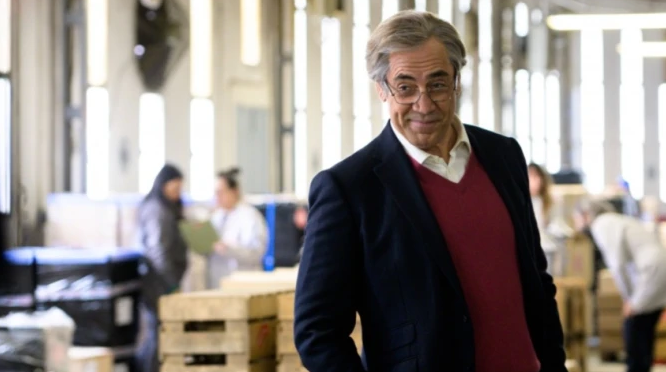The Good Boss (El buen patron)
Cohen Media Group
Reviewed for Shockya.com & BigAppleReviews.net, linked from Rotten Tomatoes by Harvey Karten
Director: Fernando León de Aranoa
Screenwriter: Fernando León de Aranoa
Cast: Javier Bardem, Manolo Solo, Almudena Amor, Óscar de la Fuente, Tarik Rmili
Screened at: Critics’ link, NYC, 6/30/22
Opens: August 26, 2022
Most of us have to work to earn a living, so we have to put up with all kinds of bosses. Fernando León de Aranoa presents the kind of employer we all dream of having. At first. He is fatherly, older than most of his employees. He has meetings praising them for what they do for their company, a middle-sized manufacturing plant in a small city that makes scales. Blanco (Javier Bardem) is not only a “good boss,” but is also a perfectionist who worries that the large scale serving as a logo on company grounds is unbalanced, and since he will be meeting in a few days with a committee that will issue an award to the best of three nominated firms, he finds a way to balance the scale that is lightly off kilter.
It may surprise some that work in the factory that he the kind of person who exudes good vibes is also one who can stab you in the back, even as he lowers the boom on Miralles (Manolo solo), a childhood buddy who has worked for the firm for twenty-two years and makes the mistake of leaning on the boss by telling him his family troubles. But the victim that threatens him the most is José (Oscar de la Fuente), laid off when he considers himself too old to get another job, and who threatens Blanco’s dream of getting the business award by setting up a squatter’s production on public grounds outside the company, bad-mouthing Blanco for being anything but a good boss.
The best movie I know about the way capitalism throws people on the trash heap when they no longer satisfy the powers is “Up in the Air,” Jason Reitman’s 2009 feature showing George Clooney as Ryan Bingham, who flies around the country firing people when their bosses did not have the guts to do the job themselves. This is the kind of deflection by employers who shift the responsibility, using others to do the dirty work while remaining at a safe distance from the people they lay off. In “The Good Boss” Blanco may do the dirty deed himself, even holding meetings with the entire staff to feign humility and disappointment at having to wield the axe. However aside from bouncing an old friend, Miralles, for making an error in an order, he cuts the man short when faced with the poor man’s intention to complain to the labor board for something he, Blanco, has no problem doing himself–specifically having a liaison with Liliana (Almudena Amor) who is a fresh-out-of-school marketing intern with the company. To save his marriage, he has no compunctions about firing her when he considers her presence a threat.
The film starts with a fight between a group of Spanish toughs beating up an Arab, an incident that seems forgotten as the story winds on but has significance near the conclusion. Some features of Spain today must be horrifying Franco in his grave: the acceptance of refugees from the Middle East and rules that prevent bosses from firing workers without legal cause. Writer-director Aranoa dealt with similar problems of the working class with his 2002 “Mondays in the Sun” (Los lunes al sol) featuring unemployed dock workers whose weekdays are like Sunday. With “The Good Boss” he appears to say that the best way to satirize bosses who manipulate employees with seeming affection only to treat them cruelly because “they can” is to laugh at them rather than criticize them outright. Here in the U.S. we have politicians who lie, getting away with falsehoods because they know how many others in the game depend on their good will. Aranoa might be spot-on, as consider the good work that comedians like Stephen Colbert (The Late Show) are doing by showing these villains what buffoons they really are.
120 minutes. © 2022 by Harvey Karten, Member, New York Film Critics Online
Story – B+
Acting – B
Technical –B
Overall – B

